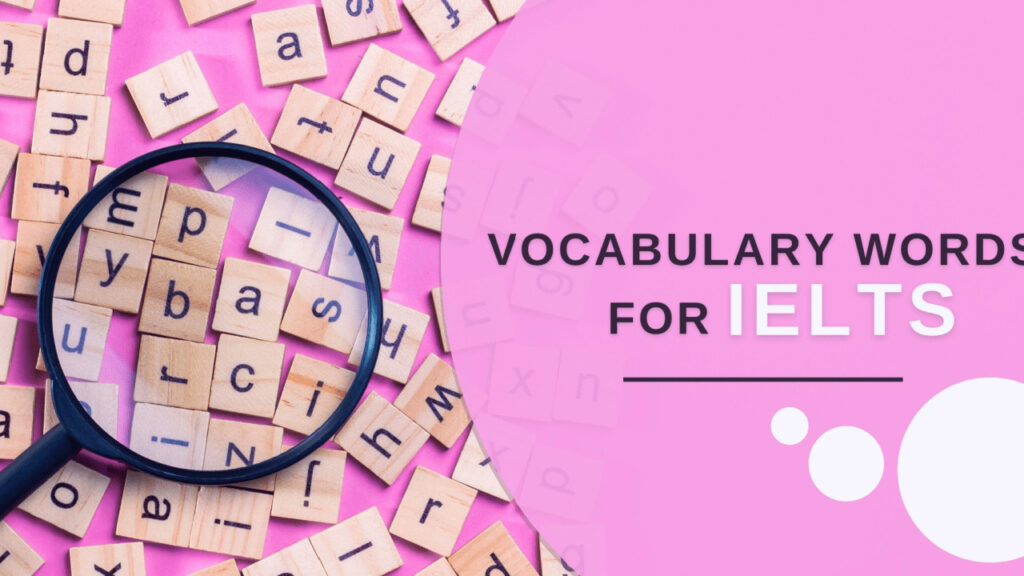Are you struggling to find the right English vocabulary for IELTS to express your thoughts accurately and fluently in the exam? Many talented students know the answers but hit a scoring wall because they lack the sophisticated vocabulary words for IELTS that examiners reward.
In fact, Lexical Resource (Vocabulary) accounts for 25% of your score in both the Speaking and Writing tests. The difference between saying a city is “very old” and describing it as “steeped in history” or “architecturally rich” often comes down to this one factor.
This 2026 guide is your complete solution. We’ve curated the essential IELTS words and strategic approaches from collocations to paraphrasing to help you seamlessly integrate high-value language and confidently target a Band 7 or higher. Stop memorizing endless lists; start applying the right words, in the right context, today.
Why Vocabulary for IELTS Speaking Matters?
To succeed, you must understand what examiners are actually evaluating. It’s not about using rare, complex words incorrectly; it’s about control, diversity, and naturalness.
1. Core Scoring Components: Range, Accuracy, and Appropriateness
The criteria for Lexical Resource measure three key aspects:
- Range (Diversity): Using a wide variety of words and phrases across different topics. Avoid repetition by employing synonyms and thematic IELTS English words.
- Accuracy (Correct Usage): Using words, phrases, and especially collocations correctly in context. Incorrect usage of a complex word actively harms your score.
- Appropriateness (Naturalness): Demonstrating the ability to use idiomatic expressions and formulaic language naturally without sounding memorized or forced.
2. The Band 6 to Band 8 Shift: Vocabulary in Action
The contrast between lower and higher band scores highlights the impact of lexical choice:
| Aspect | Band 6 Performance | Band 8/9 Performance |
|---|---|---|
| Word Choice | Simple terms, overuse of common words (“good,” “big,” “important”). | Precise, subtle selection of words and synonyms; wide lexical diversity. |
| Fluency Indicator | Might struggle to paraphrase; uses basic linking words. | Uses idiomatic language easily and appropriately; effective use of discourse markers. |
| Example | “I think technology is really good because it helps people to do things faster.” | “I think technological changes have transformed the way we tackle routine activities, greatly raising productivity and efficiency.” |
Strategic Vocabulary for IELTS Speaking (Part 1, 2, 3)
The IELTS Speaking test requires a balance of conversational fluency and advanced expression. Focus on formulaic expressions and topic-based words.

Get a Free IELTS Vocabulary Cheatsheet
With 350+ words you should know for a 7+ IELTS band score.
1. Part 1: Everyday & Personal Topics
This section is about your life (work, study, home, hobbies) and requires natural, conversational language.
- Strategy: Use the language of personal experience and relationships. Focus on being supportive and empathetic in your descriptions.
| Topic Area | Subpar Word | IELTS Speaking Vocabulary | Example of Use |
|---|---|---|---|
| Relationships | Close | Close-knit | “I come from a close-knit family that gathers every weekend.” |
| Home | Comfortable | Cozy | “My flat has a cozy atmosphere, ideal for studying.” |
| Personality | Goal-driven | Ambitious | “My colleague is highly ambitious and constantly pursues new qualifications.” |
| Health | Inactive | Sedentary | “Many office workers lead quite sedentary lifestyles.” |
2. Part 2 & 3: Descriptive and Abstract Language
Part 2 requires descriptive language to set a scene, while Part 3 demands abstract discussion related to social issues, policies, and trends.
- Strategy: Use sensory adjectives for descriptions (Part 2) and academic/conceptual terms for discussions (Part 3).
| Topic Area | Subpar Word | IELTS Speaking Vocabulary | Relevance (Part 2/3) |
|---|---|---|---|
| Travel | Beautiful | Picturesque | Descriptive (Part 2, place) |
| Art | Interesting | Compelling | Descriptive (Part 2, book/film) |
| Technology | Advanced | Cutting-edge | Abstract (Part 3, innovation) |
| Global Issues | Protection | Conservation | Abstract (Part 3, environment) |
3. Collocations and Idioms: The Fluency Factor
High-proficiency candidates (Band 8+) use collocations (e.g., draw attention to, meet expectations) and idioms fluently, even when using high-frequency vocabulary words for IELTS.
- Collocations: Learn these set phrases to sound native and professional:
- Raise awareness: Increase public knowledge
- Bridge the gap: Connect two different things
- Face challenges: Deal with difficulties
- Take into account: Consider as a factor
- Idioms (Use Strategically): Integrate one or two natural idioms into your response, but avoid forcing them.
- “To be honest, that whole situation was a blessing in disguise for me.”
- “We must all think outside the box to find a solution.”
High-Band Vocabulary for IELTS Writing (Task 1 & 2)
The IELTS Writing test, especially Task 2 (academic essay), requires a high level of formal, objective, and accurate English vocabulary for IELTS.
1. General Academic Vocabulary and Synonyms
In academic writing, you must avoid repeating yourself and use precise language. This general academic IELTS vocabulary list applies to almost any essay topic:
| Basic Word | Advanced Alternative (Synonyms) | Example Application (Writing Task 2) |
|---|---|---|
| Important | Crucial, pivotal, indispensable, paramount | Education plays a pivotal role in shaping one’s career trajectory. |
| Show | Demonstrate, illustrate, exhibit, reveal | The data clearly illustrates the rising trend in urban migration. |
| Big | Substantial, considerable, significant, enormous | Technology has had a significant impact on communication patterns. |
| Make | Create, produce, generate, establish | Governments must establish stricter laws to curb pollution. |
2. Academic Phrasing and Topic-Specific Terms
For Task 2, use high-register, formal expressions. Focus on the four most common essay topics: Technology, Education, Environment, and Society.
| Topic Area | Word | Meaning | Formal Application Example |
|---|---|---|---|
| Solutions | Alleviate | To make a problem less severe | Measures must be implemented to alleviate poverty in developing nations. |
| Trends | Ubiquitous | Existing everywhere at the same time | The use of mobile devices has become ubiquitous in modern society. |
| Economics | Volatile | Changing rapidly and unpredictably | The global energy market remains highly volatile. |
| Education | Pedagogy | Teaching methods approach | Modern pedagogy emphasizes student-centred learning over traditional lectures. |
| Environment | Sustainable | Environmentally responsible practice | Policies promoting sustainable consumption are essential. |
3. Elevating IELTS Grammar and Vocabulary with Paraphrasing
Paraphrasing is essential for Task 2 to show your ability to rephrase the prompt and maintain variety. Practice replacing simple ideas with complex phrasing:
| Original Sentence (Simple Idea) | Paraphrased Sentence (Advanced Lexis) |
|---|---|
| I like reading books. | I find immense pleasure in reading, and I am an avid reader. |
| Technology is very important nowadays. | Technological advancement has transformed society, making it integral to contemporary living. |
| Young people use social media a lot. | Social media consumption is ubiquitous among the younger demographic. |
The Critical Role of IELTS Grammar and Vocabulary Connectives
Using linking words (discourse markers or connectives) is a simple way to boost your Coherence and Cohesion score (another 25%) while sounding professional. They organize your ideas clearly for the examiner.
1. Formal Connectives for Writing and Speaking Part 3
These are best suited for academic essays and high-level discussions:
| Type | Function | Examples |
|---|---|---|
| Addition | To add another point | Furthermore, Moreover, Additionally, In addition |
| Contrast | To introduce a conflicting idea | However, Conversely, Whereas, Nevertheless |
| Result | To state a conclusion | Therefore, Consequently, As a result, Thus, Hence |
| Opinion | To introduce a viewpoint | In my view, I would argue that, From my perspective |
2. Discourse Markers for Speaking Fluency
These markers make your spoken response sound natural, giving you time to think and organize your thoughts without long pauses.
- Thinking Time: Well, To be honest
- Clarifying/Emphasizing: Actually, Basically, Essentially, Fundamentally, In fact
- Generalizing: Generally speaking, By and large
Practical Strategies: Building Your IELTS Vocabulary List
As expert counselors, we advise moving beyond rote memorization. These strategies ensure your new vocabulary for IELTS is acquired and applied correctly.
1. Contextual Learning and Topic Organization
- Organize by Topic: Instead of a single, massive IELTS vocabulary list, create smaller lists organized by frequent topics (e.g., Media, Work, Globalisation).
- Use the L1 Distinction (For Indian Students): Research indicates Hindi L1 speakers may show weaknesses in lexical diversity at higher band scores. To counter this, constantly focus on replacing the generic words (good, bad, important) with varied synonyms and practice syntactic complexity (using varied sentence structures).
- Learn Forms and Collocations: Always learn a word with its various forms (Noun, Verb, Adjective, Adverb) and common word partners (collocations). For instance, learning ‘Impact’ as a noun, verb, and adjective (impactful) along with its collocations (profound impact, impact factor) ensures accuracy.
2. Active Practice and Self-Correction
- Documentaries and Media: Watch English documentaries or Ted Talks and actively note useful, fluent expressions and topic-specific terms. This builds your bank of IELTS English words in context.
- Record and Review: Record yourself answering practice questions. Identify repeated words, then make a conscious effort to replace them with more advanced alternatives and collocations in the next recording.
- Self-Diagnosis: Engage in high-utility practice, like writing a summary of a complex article, and then actively quantify your performance by checking your use of synonyms and sentence structure. This focused effort targets your personalized weaknesses.
3. Avoid Common Lexical Mistakes
- Do not over-use rare words: Examiners can spot forced, unnatural responses. If a word doesn’t flow naturally, don’t use it.
- Do not repeat the same advanced word: Using the term Conversely five times shows a lack of lexical range, even if the word itself is high-level.
- Do not confuse word forms: Mixing up a noun (e.g., volatility) with an adjective (e.g., volatile) leads to grammatical errors that lower your score.
Conclusion:
Achieving a high band score in IELTS is entirely within reach with a focused and strategic approach to vocabulary for IELTS. Remember that examiners reward accuracy, naturalness, and diversity of IELTS words used correctly in context, not the simple memorization of isolated, complex terms. By mastering topic-specific vocabulary words for IELTS, applying collocations and paraphrasing, and consistently practicing, you will develop the fluency and sophistication needed for success.
Start integrating these high-value techniques into your study routine today. Planning to apply to top universities abroad for the 2026 intake? Getting guidance from a trusted mentor can streamline your preparation. LeapScholar experts are here to help you move from preparation to application, ensuring your comprehensive language skills give you the competitive edge in admissions.
Frequently Asked Questions(FAQ’s)
-
How can I get 8.5 in IELTS?
Learn complex grammatical structures and use sophisticated vocabulary naturally. Practice extensively across all four skills: reading, writing, listening, and speaking. Get regular feedback from experienced tutors and improve your accuracy.
-
Is IELTS 7 hard or easy?
IELTS 7 is moderately challenging for most students. You need strong grammar, varied vocabulary, clear pronunciation, and coherent writing. With 2-3 months of focused preparation and existing intermediate-advanced English skills, it’s achievable.
-
How can I improve my vocabulary for IELTS quickly?
Read English articles daily, learn topic-specific words, use flashcards, practice synonyms, and apply new words in speaking and writing regularly.
-
What are the common IELTS Speaking topics?
Common topics for IELTS speaking include family, hobbies, work, education, hometown, travel, technology, health, environment, and daily routines. You might also discuss books, movies, sports, or social issues.
-
Do idioms raise the IELTS Speaking band?
Idioms will come in handy only if you naturally and appropriately use them. Do not force idioms in every single answer because then it won’t sound natural. Use one or two suitable idioms to reflect your robust language skills. But simple communication is what counts the most. You can get high without idioms using diverse, precise vocabulary instead.
-
What is the best vocabulary for IELTS?
Learn academic vocabulary such as “significant,” “demonstrate,” and “consequence.” Utilise topic-specific words in widely used essay topics such as environment, education, and technology.
-
How much vocabulary is sufficient for IELTS?
You require approximately 3,000-5,000 words for IELTS to achieve a high band score. Quality is more important than quantity, learn how to utilise each word appropriately in sentences instead of memorising random vocabulary words from the IELTS Vocabulary Words PDF.
















Have Questions? Get Guidance to reach your Dream University
Connect with India's finest counsellors and biggest study abroad community.
Get Guidance